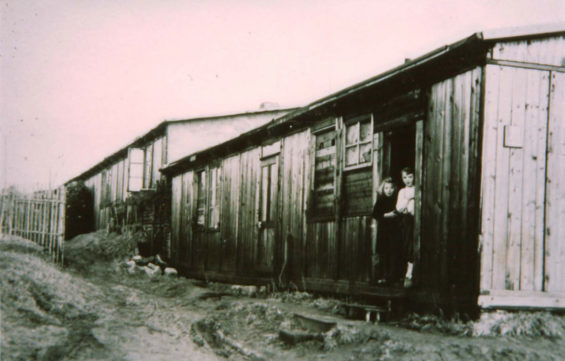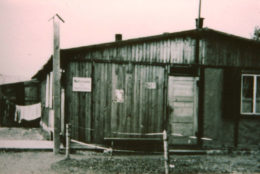Helmbrechts Subcamp
July 19, 1944 – April 13, 1945
Starting September 1, 1944, was under the authority of the Flossenbürg concentration camp
![]()
![]()
Barracks of the Helmbrechts subcamp, around 1950 (Photo: Klaus Rauh). After the war the barracks of the subcamp served as accommodation for ethnic Germans expelled from the east.
![]()
Aerial photo of the housing development that was constructed on the former camp grounds in Helmbrechts, 2019 (Flossenbürg Concentration Camp Memorial / Photo: Rainer Viertlböck)
-
Prisoners
Up until April, some 680 non-Jewish female prisoners from the Ravensbrück concentration camp were transferred to the subcamp. Most of them were from Poland, the Soviet Union, and the former Czechoslovakia. On March 6, 1945, 621 Jewish women (mainly Hungarians) arrived at Helmbrechts via a death march from the Silesian subcamp Grünberg, attached to the Groß-Rosen concentration camp.
-
Forced labor and quarters
Production of cables and munitions for the armaments company Kabel- und Metallwerke Neumeyer (Nuremberg) in a disused textile factory. At first, the women were quartered there, later in a barracks compound enclosed by a barbed-wire fence, a kilometer from the factory.
-
Guards
14, later 21, SS men and 20 to 23 female overseers. Detail leader Alois Dörr refrained from taking action against the mistreatment and murder of prisoners by the guards and overseers.
-
Death toll
Some 10 to 20 non-Jewish prisoners (up until March 1945); at least three women were beaten to death or hung in Flossenbürg after escape attempts. Up until mid-April, 40 to 50 Jewish women died.
-
Disbanding of the camp / end of the war
The camp was disbanded on April 13 and the women forced to march to Zwodau. In Zwodau, some non-Jewish prisoners were left behind, while other Jewish prisoners joined the remaining contingent of women from Helmbrechts and forced to march southward. Around 200 women died from exhaustion or were murdered during the march.
-
Commemoration
At Helmbrechts cemetery a memorial plaque and a stone from Volary memorialize the victims of the subcamp and the death march.
-
In Schwarzenbach a.d. Saale, at the site of the first overnight stay during the death march to Volary, two panels describe the subcamp.


